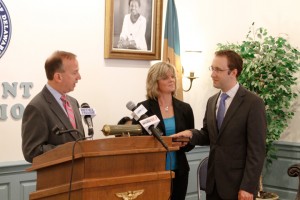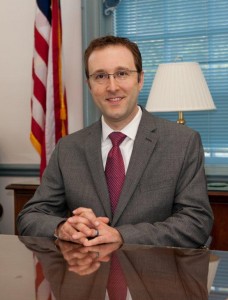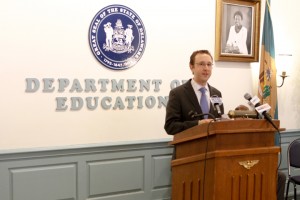The following guest column was written by Delaware Secretary of Education Mark Holodick.
Recently, the UCLA School of Law released a database showing that Delaware is the lone state to have zero measures enacted or even introduced that would ban instruction on how race and law have been used to produce systemic discrimination, more commonly known as critical race theory (CRT). Delaware does not teach CRT. Never has.
But the information got me thinking – and reflecting – about my time as an educator in our state three decades ago, and how much we’ve grown in the space.
During the 1990s, I taught sixth grade social studies, eighth grade U.S. History, and 6-12th grade world history and sociology in New Castle County public schools. I loved my job. I was a young, excited, and – I believed – thorough educator, relying on so much more to instruct my students than the history books and curriculum I had been provided. I focused on teaching the complete history of our country, including slavery. I wanted my students to understand slavery’s impact on our nation’s economic growth and current U.S. economy, and also the hardships those who were enslaved endured as they helped build this country. I even used the internet to access websites that many of my colleagues did not yet know existed in this emerging space. In that moment in time, during that period of my life, I believed I was creating an excellent educational environment for each and every one of my students.
I was wrong. In retrospect, I fell far short of teaching about the complexities of our country’s past, and I missed even more opportunities to connect historic events to current situations. Black history is about more than slavery; it includes an understanding of racial injustices that continue to happen today while also celebrating and honoring the accomplishments of so many in the face of these injustices. For my students, it meant that I never fully opened the door for the type of thought-provoking and reflective conversations that were needed in the classroom. More importantly, I failed to allow so many of my students an opportunity to see themselves in our country’s history, to learn from our nation’s prior mistakes, and to be inspired by the amazing, diverse figures that could have made them dream bigger in their own lives.
I have always known that great teachers take time to self-reflect and analyze their curriculum and pedagogy. I have done this repeatedly in my own career and continue to do so with the understanding there will always be areas I can improve upon. And even with that knowledge, I also recognize that teachers are only one part of a larger educational system that too often fails to reach every student. Equitable practices and culturally responsive education have become helpful instructional strategies, but educators can still only teach what they know and learn.
For this reason, the passage of House Bill 198 – incorporating Black History in every Delaware student’s education – holds such promise in our classrooms, for our future and for a more accurate and thorough awareness of where we have been as a country, where we are now, and where we are going.
While other states and local governments were attempting to ban race-related instruction, Representative Sherry Dorsey-Walker and a host of other legislators, students, educators and advocates were actively promoting Delaware HB 198, which requires every district and charter school to establish and implement Black history curriculum each year from kindergarten through graduation.
In June 2021, HB 198 became Delaware law. This January, the Delaware Department of Education released its first annual Black History Education Report detailing how schools are faring so far with implementation.
HB 198 has placed Delaware’s educational system in a position to help our community grapple with past mistakes, celebrate the successes and contributions from communities of color that are often overlooked, and gain a better understanding of why situations are the way they are across different areas of Delaware and the country.
The opportunity rests and waits for us to use this information to inform our thinking about current events. This is what we hope to mirror in our classrooms. While other federal, state, and local school boards across the U.S. are hyper-focused on CRT and avoiding racial conversations altogether, Delaware is proactively bringing educators together to listen, learn, develop and then teach. This is the type of adult growth required any time we expect our students to grow. HB 198 is historic. It is not about guilt or villainizing. It is not political. It is not an experiment or an attempt to appear genuine. By no means will it ever be a quick fix. HB 198 is really about instructional progress and allowing educators to gain a deeper understanding of our country’s past. By design, students then also gain a deeper understanding of where we have been as a society, why this history matters, and how we can all use this information to help inform a better future.
HB 198 is long overdue. We are doing it alone, but we are finally getting it right.
Read all updates from Secretary Mark Holodick.
Media contact: Alison May, alison.may@doe.k12.de.us, 302-735-4006
 Krzanowski has more than 16 years of experience in early learning as a former early childhood teacher, center administrator and higher education faculty member, most recently as instructional director/Education Department chair at Delaware Technical Community College.
Krzanowski has more than 16 years of experience in early learning as a former early childhood teacher, center administrator and higher education faculty member, most recently as instructional director/Education Department chair at Delaware Technical Community College.

